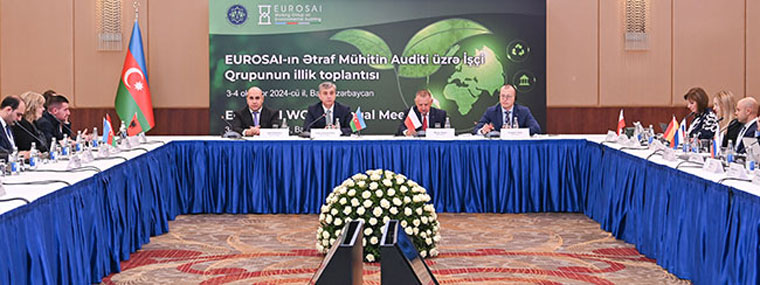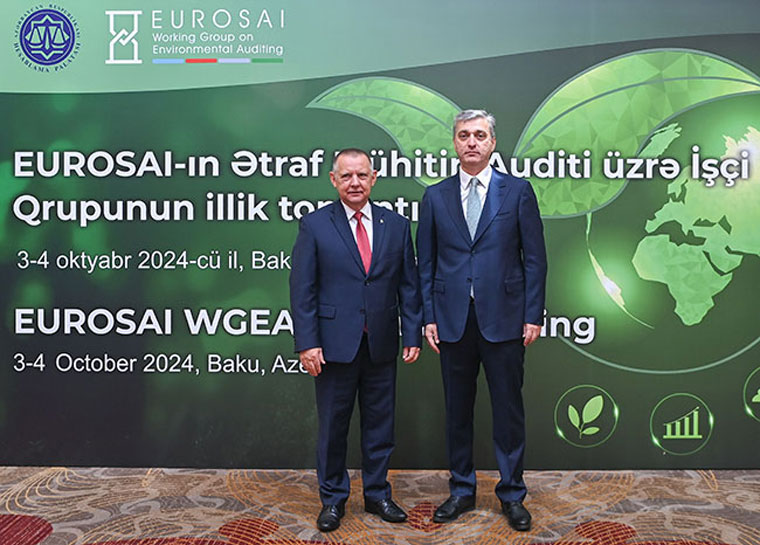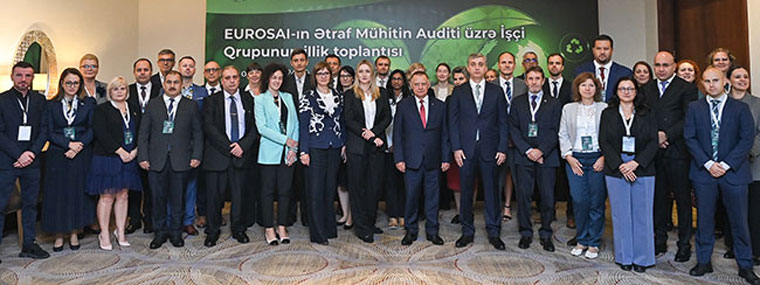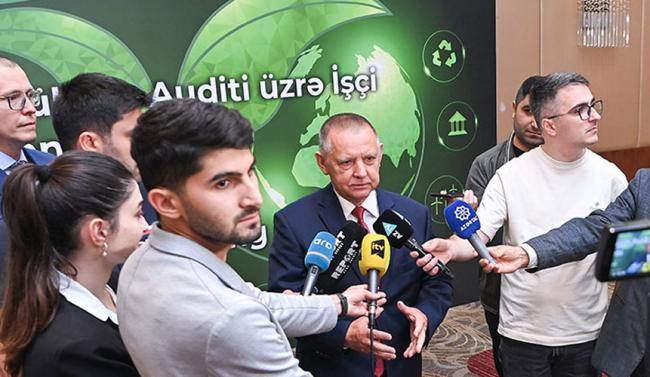Marian Banaś, who opened the meeting, underlined the key role of NIK audit results in counteracting flood risks in Poland, regarding task performance audits related, among others, to flood protection, spatial planning of buildings in flood areas, flood protection infrastructure, as well as annual audits of the financial statements of the Odra-Vistula Flood Management Project. The President also communicated that in May this year the EUROSAI Congress entrusted NIK with subsequent three-year term of the EWGEA Chair.

The meeting in Baku, which was held in a hybrid format, was attended by a total of 81 auditors from 36 SAIs of EWGEA members. Presentations during the meeting were given by representatives of the European Commission, the European Space Agency and the Polish Institute of Meteorology and Water Management, as well as SAI representatives. On the second day of the meeting, workshops were held, moderated by representatives of the European Court of Auditors and the SAIs of the Czech Republic and Belgium.
In these times of turbulent social and economic changes, overlapping consequences of climate change, energy and economic crises, we are observing increased streams of migration from countries painfully affected by the effects of climate change. Climate change carries the need to change the way we use the environment so as to minimise the temperature rise and prevent exceeding the Earth's strength limits. Reaching these limits will cause irreversible changes in the biosphere. One of the consequences of climate change is an increase in the frequency of extreme weather events caused by wind, water and fire, which are becoming more intense and their effects more severe.
For the population of areas particularly vulnerable to natural disasters to survive, it is crucial to accurately forecast the occurrence of extremes, such as torrential floods, hurricanes, droughts and an increase in the risk of fires. The condition for minimising the damage caused by them are accurate and timely forecasts, without which it would be impossible to send warnings and calls for evacuation from endangered areas. To meet the challenges posed by the scale of extreme weather conditions in recent years and prevent damage to people and the environment, progress in the weather prediction technology is vital.

The EWGEA meeting in Baku was opened with a presentation on the capacity of the satellite observation programme named Copernicus in terms of preparing the support, including: forecasting, assessment of risk occurrence and risk severity, risk management and analyses of eliminating consequences of extreme weather events and catastrophes. The presentation was given by a representative of the Joint Research Centre of the Directorate-General (three Directorates-General: Directorate-General for Defence Industry and Space (DG DEFIS), Directorate-General of the Joint Research Centre (DG JRC) and Directorate-General for European Civil Protection and Humanitarian Aid Operations (DG ECHO)). Within the framework of the Copernicus Emergency Management Service (Copernicus EMS) – being part of the Copernicus programme – bodies responsible for the management of natural disasters, crisis situations inflicted by humans and humanitarian crises receive a geospatial update obtained by means of satellite remote sensing and complemented with in situ sources and open data sources.
The early warning component of the Copernicus EMS includes:
- the European Flood Awareness System (EFAS), which provides information on ongoing and forecasted floods in Europe up to 10 days in advance;
- the European Forest Fire Information System (EFFIS), which provides near real-time and historical information on forest fires and forest fire systems in the European, Middle East and North African regions;
- the European Drought Observatory (EDO), which provides drought information and early warnings for Europe.
The COPERNICUS programme, coordinated and managed by the European Commission, is being implemented in cooperation with the EU Member States, the European Space Agency (ESA), the European Organisation for the Exploitation of Meteorological Satellites (EUMETSAT), the European Centre for Medium-Range Weather Forecasts (ECMWF). During the meeting in Baku, a representative of the Directorate of Earth Observation Programmes ESRIN (European Space Research Institute) at the European Space Agency discussed ways of observing and predicting extreme events using satellite data. The auditors from the SAIs of the EWGEA states presented the results of recent audits of the administration’s preparedness for natural disasters, for their prevention, elimination of consequences and assistance to people affected by them. During the workshop on climate risks the meeting participants emphasised that the climate threats occur faster than the progress in developing and implementing the EU policies. The attendees also agreed that in terms of the natural disaster risk management a higher degree of diligence is needed to improve Europe’s resilience to natural disasters and coherence of the implemented policies. The issues of social justice and leaving no one outside the European regulations have to be at the heart of climate change adaptation policies.

During the meeting of the EWGEA Steering Committee in Baku, the progress of the group's work and plans for the future were discussed, as well as current projects, i.e. the ECA and UK SAI’s project on climate change and the Climate Scanner implemented by the SAI of Brazil.
The frequency and severity of extreme weather events and natural disasters are increasing, from unprecedented forest fires and heatwaves to devastating droughts in the Mediterranean. In the long term, gradual phenomena such as desertification, biodiversity loss, soil and ecosystem degradation, ocean acidification and rising sea and ocean levels are equally devastating. The next EUROSAI WGEA meeting is scheduled for May 2025 in Warsaw and will focus on the effects of climate change on agriculture.
The persons interested in presenting the results of the NIK audit or moderating workshops during the EUROSAI meeting are kindly requested to send their proposals to the following address: eurosaiwgea@nik.gov.pl


